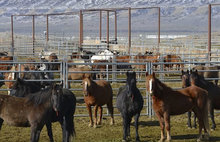The American Wild Horse Preservation Campaign (AWHPC) is calling upon Whole Foods Market to stop selling beef supplied by ranchers behind the massive roundup of 1,400 wild horses currently underway in Oregon.

Wild horses in BLM holding pen
By providing a commercial venue for CNB beef products, Whole Foods is financially endorsing and contributing to this unnecessary and inhumane removal of iconic mustangs from our public lands.
© 2015 by Mustang Heritage Foundation
The roundup is being conducted to allow members of the Beatys Butte Grazing Association to run more cows on the public lands from which the wild horses are being removed. Several members of the Grazing Association supply beef to Country Natural Beef, a Burns, Ore. supplier to Whole Foods. These ranches include Roaring Springs Ranch, the Fitzgerald Group, Fitzgerald Ranch and Otley Brothers Ranch.
Stacy Davies, the head of the Beatys Butte Grazing Association is also the marketing director for Country Natural Beef (CNB) and manager of Roaring Spring Ranch. Mr. Davies has been a vocal proponent for the mass removal of mustangs from the Beatys Butte Herd Management Area, which is federally-designated as wild horse habitat.
In addition to Beatys Butte, CNB suppliers also hold permits in other Oregon-based Herd Management Areas that saw horse roundups this year. In total, 2,000 wild horses â nearly half the stateâs remaining wild horse population â will be removed from public lands in Oregon this year.
In a statement, AWHPC said: âWhole Foodsâ sale of beef from entities that graze cattle on public lands in designated mustang habitat fuels a system that brutalizes these iconic animals and denies them a federally declared right to be free on our public lands. Clearly, this is not in line with Whole Foodsâ customer values or its principles of Environmental Stewardship.â
Each year, pressure from ranchers who graze cattle and sheep in designated wild horse habitat results in roundups throughout the West. Many ranchers view iconic mustangs as competition for cheap, taxpayer-subsidized grazing land.
As a result, thousands of wild horses are chased down by helicopter, stressed, put at risk for injury and death, separated from their families (bands) and removed from their native land.
Only a handful of horses are adopted out to new homes, while more than 50,000 are living out their lives in taxpayer-funded holding facilities. In fact, there are now as many wild horses in holding facilities as remain free on the range.
AWHPC noted that wild horses and burros inhabit less than 20 percent of public land available for livestock grazing, so conflicts between mustangs and ranchers should be resolvable.
AWHPC has urged Whole Food to adopt a mustang and burro safe policy that prohibits the sale of beef or lamb sourced from animals grazing on public lands in federally designated wild horse and burro habitat areas.
The organization added that: âSupport and action from Whole Foods would create a force for change to protect these national icons and secure fairer and more humane treatment of them by our federal government.â
The American Wild Horse Preservation Campaign (AWHPC) is dedicated to defending Americaâs wild horses and burros to protect their freedom, preserve their habitat, and promote humane standards of treatment. AWHPCâs mission to preserve and protect wild horses and burros in viable free-roaming herds on public lands for generations to come is endorsed by a coalition of more than 60 horse advocacy, public interest, and conservation organizations.
